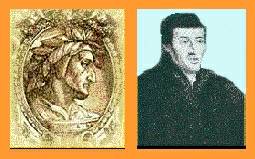|
PinkMonkey Online Study Guide-World History
2.5 Growth and Spread of the Renaissance
The Renaissance movement grew and spread creating splendid and lasting effects in the various fields of arts. Ancient masterpieces were rediscovered and new works were produced.
Literature
During the medieval age, all the important writing was done in Latin, which was the language of the Church. The "cultured people, generally looked down upon the European vernaculars. However in the 13th century, Dante wrote The Divine Comedy in Italian rather than Latin. This great Italian poet is regarded as the link between the medieval and the modern world, since his works dealt with love among humans, patriotism and love of nature. Dante’s example was soon followed by others. Thus Patriarch wrote a series of love sonnets to "Laura". He roused the interest of the people in the great works of Virgil, Cicero, Livy and others. Bocaccio wrote "his racy stories in Italian", the Decameron. Machiavelli wrote his historical works and his Prince as a guide for rulers. Ariosto wrote a popular poem ’Orlando Furioso’, while Tasso composed his epic Jerusalem Delivered.

Exhibit 2.2
Renowned Italians of the Renaissance: Dante and Machiavelli
A great contribution was made to German literature by
Martin Luther. He offered a translation of the Bible. Spanish literature
flourished with the works of several genius minds such as Cervantes
who is known by his immortal Don Quixote which made fun of
medieval feudalism and decadent chivalry. Lope de Vega composed about
1800 dramas, while Calderon wrote an allegorical poem.
Portuguese literature reached its height in the Lusiads of Camoens, a patriotic epic dealing with the wonderful voyages and exploits of Vasco da Gama.
[next page]
|